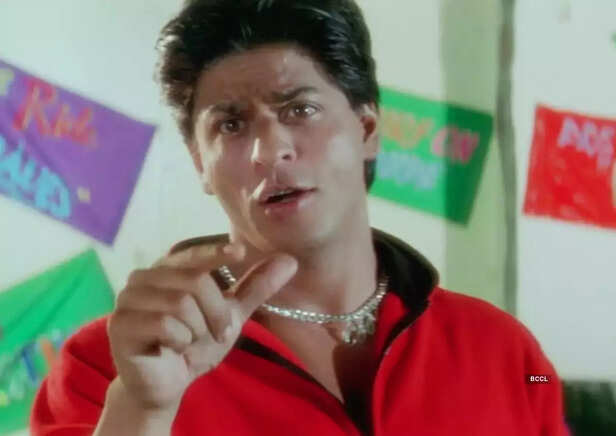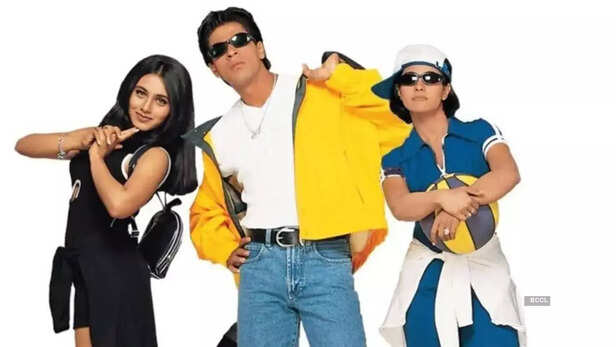Promise? Even Rahul Couldn't Commit to One Girl !
Rishit raj | Feb 18, 2025, 23:41 IST
This article explores the theme of commitment in relationships, drawing parallels between the iconic character Rahul from Shah Rukh Khan's "Kuch Kuch Hota Hai" and the commitment dynamics of today's Generation Z. We delve into how cultural depictions influence modern dating habits, examining why commitment seems more challenging now than ever and what this means for contemporary love stories.
The 1998 Bollywood classic "Kuch Kuch Hota Hai" introduced us to Rahul Khanna, portrayed by Shah Rukh Khan, a character whose charming yet commitment-phobic nature left an indelible mark on Indian cinema's portrayal of love. Fast forward to today, and it seems like Rahul's struggle with commitment might resonate more than ever with Generation Z. But why does it seem that even Rahul couldn't commit to one girl, and how does this reflect in today's relationship dynamics?

Rahul's story is one of love, loss, and eventual realization about what true love means. He was initially in love with Tina, but after her death, he marries his childhood friend Anjali. However, it's his journey towards understanding his feelings for Anjali that many remember—highlighting the complexities of love and commitment. Rahul's character embodies the romantic ideal of finding 'the one', yet his journey also showcases the fear of commitment, a theme that has transcended from the silver screen to real life.

Today's young adults, or Generation Z, are navigating a world where the traditional paths to commitment are less clear. Here's how:
Bollywood has long been a mirror and a mold for societal norms around love and commitment. Rahul's character set a romantic standard but also highlighted the turmoil of commitment. Modern Bollywood, with films like "Love Aaj Kal" or "Jab Harry Met Sejal", further explores these themes, often showing characters who are more in tune with Gen Z's approach to relationships—open, exploratory, sometimes non-committal.
The digital age has reshaped how we view and pursue commitment:
If Rahul were to navigate love in 2025, he might find himself in the same boat as many young adults today: enjoying the freedom of choice, grappling with the fear of commitment, yet yearning for a connection that transcends the superficial. The narrative of commitment has evolved, influenced by cultural depictions like "Kuch Kuch Hota Hai" but also by the realities of modern life.
For Generation Z, commitment might not look like Rahul settling down with Anjali; it could be something more fluid, more personal, and perhaps, more honest to the complexities of human emotions. As we move forward, the challenge isn't just to commit or not to commit but to redefine what commitment means in a world where Rahul's love story is just one of many possible scripts.
In essence, while Rahul couldn't commit to one girl in his youth, today's youth are redefining what commitment looks like, one swipe, one conversation, and one self-reflection at a time.
The Rahul Legacy

Rahul's legecy
Rahul's story is one of love, loss, and eventual realization about what true love means. He was initially in love with Tina, but after her death, he marries his childhood friend Anjali. However, it's his journey towards understanding his feelings for Anjali that many remember—highlighting the complexities of love and commitment. Rahul's character embodies the romantic ideal of finding 'the one', yet his journey also showcases the fear of commitment, a theme that has transcended from the silver screen to real life.
Generation Z's Commitment Conundrum

Commitment
Today's young adults, or Generation Z, are navigating a world where the traditional paths to commitment are less clear. Here's how:
- Dating Apps and Options: Unlike Rahul, who had a limited pool of romantic partners, Gen Z has dating apps at their fingertips, offering an endless array of potential matches. This abundance can lead to a fear of missing out (FOMO) on someone better, making commitment seem like settling for less.
- Casual Culture:There's a prevalent culture of casual dating, hook-ups, and situationships rather than traditional relationships. This mirrors Rahul's initial reluctance to commit, but for Gen Z, it's often about exploring identity and preferences without the pressure of labels.
- Mental Health and Self-Care: A focus on mental health has led many to prioritize self-care over committing to others, fearing that relationships might detract from personal growth. Rahul's eventual commitment was part of his growth, but for many young people today, personal development often comes first.
- Economic and Lifestyle Factors: The economic landscape and the gig economy lifestyle mean that many in Gen Z are not rushing into life stages like marriage. Rahul's world was one where love was often the precursor to settling down; today, settling down is a luxury many can't afford or choose to delay.
The Influence of Bollywood
Commitment in the Digital Age
The digital age has reshaped how we view and pursue commitment:
- Social Media's Role: Just as Rahul's love was public within his friend circle, today's relationships are public on social media. The pressure to portray a perfect relationship can deter genuine commitment or make it superficial.
- Communication Overload: With constant texting, social media, and digital presence, there's an expectation to always be connected. This can either foster a deeper connection or, paradoxically, lead to commitment fatigue, where the constant need to 'perform' in a relationship becomes overwhelming.
- Changing Definitions: Commitment isn't just about marriage or exclusivity anymore. For many, it's about mutual respect, support, and understanding, with or without labels, much like Rahul's eventual realization of love.
A New Chapter for Love and Commitment
For Generation Z, commitment might not look like Rahul settling down with Anjali; it could be something more fluid, more personal, and perhaps, more honest to the complexities of human emotions. As we move forward, the challenge isn't just to commit or not to commit but to redefine what commitment means in a world where Rahul's love story is just one of many possible scripts.
In essence, while Rahul couldn't commit to one girl in his youth, today's youth are redefining what commitment looks like, one swipe, one conversation, and one self-reflection at a time.
